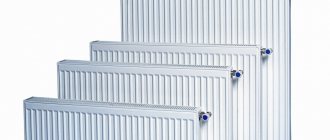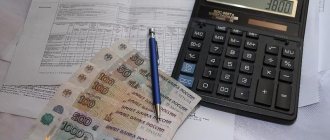Expert author of the article
Yulia Kuprina
Certified lawyer. Total work experience in the specialty is 13 years.
In most cases, installing metering devices on pipelines is beneficial. Current laws on water meters regulate the calculation procedure in the absence of water meters and in their presence. The amount to be paid in the first case may be significantly higher than when calculating by meters. In this article, we will look at the regulations in force in 2021, innovations, obligations of the apartment owner, sanctions and fines.
In the absence of IPU, the standard and increasing coefficient are applied in the calculations
According to Part 1 of Art. 157 of the RF Housing Code, clause 80 of RF PP No. 354, fees for utility services are calculated based on the readings of installed individual metering devices, and in the absence of meters - based on consumption standards approved by the constituent entity of the Russian Federation.
The owner of the premises must install the IPU (clause 81 of the Russian Federation Regulations No. 354). If the apartment has the technical ability to do this, but the owner of the apartment has not fulfilled this obligation, then the utility service provider applies an increasing factor of 1.5 to the standard when making calculations (paragraph 3 of clause 42 of RF PP No. 354).
If residential premises in an apartment building belonging to a municipal housing stock are rented out under a social tenancy agreement, then the municipality is obliged to fulfill the responsibilities assigned to it by the RF Housing Code as the owner, including equipping the apartments with private monitoring systems (Part 3 of Article 65 of the RF Housing Code). The social housing tenant, for his part, is obliged to pay for utilities and housing services on time and in full (clause 5, part 3, article 67 of the Housing Code of the Russian Federation).
It turns out that if the owner of municipal housing does not fulfill the obligation to install an IPU, then the tenant of such an apartment receives receipts with inflated amounts of payment for the utility resource and is obliged to pay it.
What you need to know about checking and replacing electricity meters
397861
Is self-installation legal?
Yes, this is not against the law. If knowledge and skills allow the consumer, his relatives, or friends to do this, then why not save on installation?
To do this you need:
Buy a device (it must be certified in the Russian Federation);- Contact the management company, HOA, DEZ or water utility with a request to turn off the water supply to the housing (apartment, house, cottage) during installation;
- Install the counter;
- Invite an employee of the relevant organization to seal and register the device;
- Receive the act of putting the water meter into operation, register it and make sure that the personal account has been re-registered from standard charging for water supply and sewerage to accounting according to meter readings. Most often, this entire procedure is carried out by a representative of the management company, HOA, water utility or DEZ, who sealed the meter.
Thus, the apartment owner will only spend money on the device itself and its components (filters, fittings, taps, etc.).
The video will show you how to install a water meter yourself:
The municipality refused to pay for the consequences of failure to install IPU in apartments
One of the management organizations of St. Petersburg faced such a situation. The management authority, judging that the municipality was responsible for the failure to install meters, issued an invoice for 615 thousand rubles to the state housing agency, which is responsible for the municipal housing stock.
This amount was the difference between the cost of the volume of electricity, calculated on the basis of the standard using an increasing factor, and the cost of the resource, which was calculated only on the basis of the standard, and was offered for payment to tenants of social apartments.
The housing agency, as well as the municipality, refused to pay the bills, citing the fact that from the moment the social rent agreement is signed, tenants of residential premises are required to pay for utilities.
How many water meters do I need to install?
For each water drainage from the main pipeline to the apartment it is necessary to install a water meter
. The number of counters varies from 2 to 4 pieces.
If in your apartment the bathroom and kitchen are located next to each other (through the wall), then most likely you have two main pipelines (“risers”): hot and cold water supply, but if the bathroom and kitchen are located at different ends of the apartment, then there are main pipelines (“risers”) ) you have four: two hot water supplies and two cold water supplies.
The exact number of water meters can always be determined by a technician during an inspection.
The owner must ensure the installation of IPU in social housing stock
The management organization filed a lawsuit demanding to recover from the state institution, which represents the interests of the city administration as the owner of apartment buildings, the amount of debt (case No. A56-18735/2018).
The court of first instance sided with the management organization. Since the municipality is the owner of premises in an apartment building, it was they who had to ensure the installation of IPU in residential premises. The defendants were unable to provide documents confirming that this was technically impossible.
The management organization had the right to conduct calculations using an increasing factor, and it was the municipality that must pay the difference in charges with and without the application of an increasing factor.
The court decided that the state institution responsible for the social housing stock and representing the administration of St. Petersburg is obliged to pay the debt.
Who pays for the error when determining the meter's capacity?
85120
How are water meters checked?
Checking can be done in two ways:
- Without removing the meter. Specialists go to the site and perform water meter tests. As a result, the owner receives a certificate indicating the date and test results. This is convenient for residents - you just need to provide unhindered access to the meter - and requires minimal time.
- With the counter removed. Representatives of the company dismantle it, take it to the laboratory and take measurements there. If they find a small problem with the mechanism, they can fix it and install the meter back. In the case where the meter is checked on site, nothing can be corrected. Therefore, the master may offer to remove it and take it for repairs or issue a certificate with a conclusion on replacement.
The easiest way is, of course, the first. It does not require disconnecting the riser to remove the device and wait for reinstallation. This can take from several hours to several days. To avoid any questions regarding the quality of the inspection, immediately check with the company whether it has the appropriate permits for this type of activity.
Verification is a paid service. The cost of checking one meter can be within 1000 rubles .
In the absence of IPU, the employer pays the standard, and the owner of social housing pays the increasing coefficient
The dispute between the management organization and the municipality regarding the payment of the increasing coefficient was put to rest by the Supreme Court of the Russian Federation, where the management company filed a complaint.
The RF Supreme Court analyzed the decisions of all previous courts and came to the following conclusions:
- The owners of the premises had to install IPU in them before January 1, 2011 (Part 4 of Article 13 No. 261-FZ, Clause 81 of the RF PP No. 354). This obligation is assigned to all owners of premises in an apartment building, regardless of whether it belongs to the state (municipal) or private housing stock and whether the owner uses this premises for living or rents out these premises.
- An increasing factor is used when calculating payments for utility resources for premises in which IPUs are not installed. An exception is the presence of an inspection report indicating the lack of technical ability to install a meter (clause 42 of the RF PP No. 354).
The housing agency against which the UO filed a claim is the representative of the owner of the disputed premises. The institution did not provide the court with evidence that there is no objective possibility of installing an IPU in the residential premises.
The Supreme Court of the Russian Federation agreed with the conclusions of the court of first instance that the consequences for failure to install meters cannot be laid on the tenants of residential premises: they are not obliged to equip apartments with metering devices and are not authorized to independently make decisions about this. Consequently, the management organization cannot, by virtue of law, impose on them the obligation to pay the increasing coefficient.
The Supreme Court of the Russian Federation overturned the decisions taken by the courts of appeal and cassation and ordered the housing agency to pay the amount of debt to the management organization in accordance with the decision of the court of first instance.
What the law says about checking and replacing meters
In accordance with Art. 13 Federal Law No. 102-FZ, all measuring instruments must be periodically verified during their use. To do this, each device is assigned its own verification period (interval). At the end of it, the water meter must either be verified or replaced with the same one with similar characteristics.
That is, further use of such a meter, as well as accounting for used water using it, is possible until the expiration of its calibration interval or its loss.
The verification date and frequency for each device are set by the manufacturer when carrying out certain tests. This information is indicated in the passport for the device.
When buying a water meter, it is important to pay attention to the date of initial verification. That is, if you buy a meter with an expiring date and install it, you will still have to recheck it or replace it soon.
Read details about the verification procedure.
The calibration interval for water meters is as follows:
- For cold water – 6 years.
- For hot water, this period is 4 years or 6 years (depending on the specific model).
This is due to the different chemical composition of water, which affects the wear of equipment.
The consumer must decide whether to change the meter or have it verified independently. According to statistics, only a small number of water meters undergo mandatory testing and, after the expiration of the verification interval, meet the stated requirements.
At the same time, the procedure for replacing a metering device in an apartment takes place in a shorter time and is accompanied by lower expenses.
Therefore, it is necessary to decide whether the meters need to be changed or examined based on the totality of all factors.
Remember
The management organization, as the provider of the utility service, has the right to apply an increasing factor in calculations in accordance with clause 42 of the RF PP No. 354 if:
- the premises are not equipped with an individual utility meter;
- there is no act confirming that it is technically impossible to install the IPU.
If the premises are part of the state or municipal housing stock, then the obligation to equip the premises with meters lies with the owner - a state or municipal authority.
Consequently, as noted by the Supreme Court of the Russian Federation, it is the public owner who must pay the difference between the cost of the resource, calculated using an increasing coefficient, and the amount accrued to the tenants of the premises based on the consumption standard. Residents of a municipal apartment should not bear financial responsibility for the failure of the owner of the housing stock to fulfill his duties.
Is it possible to refuse?
By Decree of the Government of the Russian Federation No. 344 of April 16, 2013, increasing coefficients were assigned from January 1, 2015. They are intended for those consumers who have not installed water meters.
These changes made the installation of meter(s) optional. If the Management Company or water utility is forced to do this, the owner has the right to refuse .
Standards for water supply and sanitation are 50-80% (depending on the region) higher than actual water needs. This is true for small families, but not for large ones.
Also, the volume of water consumed depends on the number of points of entry into the home (sinks, bathtubs, showers, etc.). So only the homeowner decides about the need to install this device.
Procedure for replacing water meters
Any device has the ability to fail and wear out. That is why every 4-6 years, homeowners whose houses have water meters installed must change them, as the law says.
In some cases, devices must be replaced due to the passage of a certain amount of water through them during use, since further readings may be incorrect.
When replacing meters, citizens again face waste - the same as when they were installed. For some categories of persons this service is provided completely free of charge.
The following can count on benefits when replacing a water meter:
- low-income families;
- veterans of the Great Patriotic War;
- citizens with disabilities (groups 1 and 2);
- families raising a disabled child.
In some regions of the Russian Federation, pensioners can expect free installation and replacement of water meters.
Sometimes you don’t have to wait for the next replacement. The fact is that some devices fail earlier. In this case, you need to contact the management organization or housing and communal services and write an application for early replacement of the water meter.
It may happen that when performing any plumbing work, the device becomes unsealed, or the plumber installs a new device. Then you need to call the management company and the water utility so that they can send an engineer who will carry out the work appropriate to the situation (for example, put a seal on a new device or restore it on an old meter).
ATTENTION! Look at the completed sample application for early replacement of the water meter:
Is it necessary to install them?
There is no exact requirement for the mandatory installation of a water flow meter in the Federal Law. You can do without it, but is it profitable? After all, payment for water consumption at a tariff is almost 60% higher than the average consumption rate.
Each region has the right to make individual amendments and special points to the law. Thus, according to Moscow Government Decree No. 77-PP, issued on February 10, 2004, fixed intervals between water meter verifications were canceled for residents of the capital.
Need to know! Housing and communal services should not insist that residents independently install these devices in their apartments .
It is also prohibited to advertise inspection organizations. Indeed, at the legislative level the installation of water meters is prescribed, but nothing about any admin. Punishments for those citizens who do not do this are not stated in legislative acts.
Homeowners install water meters at their own expense. The same situation applies to replacing devices.
Timing for verification of electricity meters.
Whether gas meters are changed free of charge or not, read here.
General house heat meters: who should install them, read the link:
Which brand of water meters is better to install?
There is no clear answer to the question of choosing a water meter manufacturer. When choosing a water meter, you should take into account how long the water meters work in real conditions in your city (water quality), what the calibration interval is for the model you are going to purchase, what the number of defects is, what the warranty period is.
Our service recommends water meters from the manufacturer Roskontrol. The water meters of this company honestly work out the period indicated in the technical passport (12 years), have a calibration interval of 6 years, the manufacturer gives a 3-year warranty on the devices, and the number of complaints is about 0.2-0.3%. Also, our experience in operating these meters shows that they do not “stick” to the pipes after 6 years of operation, so they can be easily dismantled if necessary. They are also resistant to hard Chelyabinsk water and do not deform.
Advantages of the new meter verification rules
The introduction of electronic document management makes it possible to simplify the verification procedure for the consumer, but not only that. Also in this case, the possibility of using various fraudulent schemes is eliminated and, in addition, if necessary, the data reconciliation procedure does not present problems and is carried out promptly. But you definitely need to know that the requirements for inspectors remain the same, that is: they must provide an official document
, confirming their identity and authority. You also need to pay attention to the behavior of specialists: their actions should be clear and understandable to the consumer, the questions asked should not go beyond their competence, and they also do not have the right to demand additional payment. It is important to remember about your personal safety. Therefore, it is not recommended to accept inspectors alone; it is preferable to involve close relatives and neighbors. This advice is especially important for lonely older people.
Legitimate reasons for refusal to install a water meter
Each regional entity and municipalities at the local level have a program that is developed on the principles of conservation and conservation of natural resources. One of the types of savings is usually considered to be the provision of accounting for the used natural resources. And although these indicators are focused on commercial housing, each municipal formation allocates part of the funds for the provision of water meters in pursuance of economic programs for the efficient use of resources.
There are priority lists for providing the population with a water meter, but only if there is a benefit, which is determined by each region independently. In other cases, the following reason may serve as a legitimate refusal:
- the inappropriateness of installing a water meter due to the dilapidation of the house;
- ineffective installation of the device in places technically unsuitable for these purposes;
- The lease agreement contains a condition for the provision of a water meter and its replacement, if necessary, at the expense of the tenant.
Is it possible to buy meters and fittings yourself?
Of course, any owner has the right to independently buy a water meter and fittings for it, so that a specialist can install them later.
It is worth considering that the market offers a huge number of options for water meters from different manufacturers, and, without experience in using water meters, the buyer very often makes a choice based on price, and in this case, price is not an indicator of quality
. And the variety of mounting fittings is amazing.
It is very important to know what material the elements of the future structure are made of. Brass or bronze will last much longer
aluminum based alloys. Do not use plastic to install a hot water supply system. Plastic connectors and fittings are not durable at high temperatures.
We recommend that you consult with specialists who install such equipment before purchasing it yourself. In turn, the equipment we install and offer has been tested for many years in operation by our clients and we will offer you only the best solutions.
Normative base
The following legislative documents are devoted to the division of powers for housing maintenance depending on the right to own it:
- The obligations of the lessor are specified in [1]Article 676 of the Civil Code of the Russian Federation.
- [2] Federal Law No. 261 of the Russian Federation, which explains the responsibilities of the population and responsible utility companies for ensuring accounting of the natural resource used with the mandatory use of metering devices.
- The basic rights and responsibilities assigned to the owners of residential premises are enshrined in [3]Article 65 of the Housing Code, with the disclosure of the concept of individual metering devices for each dwelling.
However, from existing practice and emerging precedents, it is clear that the existing laws in terms of installation and further operation of accounting mechanisms are not regulated to the proper level that would satisfy the interests of all citizens.




